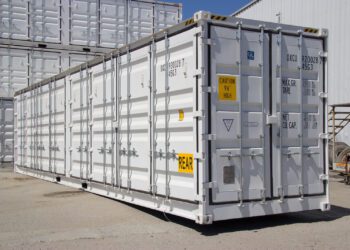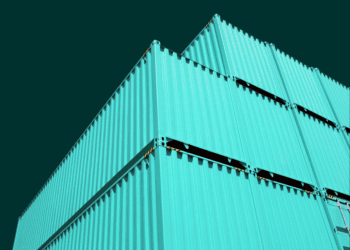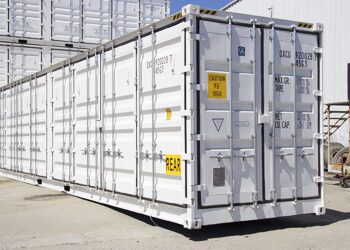There are so many different shipping container names that many people wonder if they are using the correct name for a cargo container, sea can, or storage container. To add to the confusion, there are also various types of containers that can add to the many names of shipping containers amongst multiple industries and countries. This article explores the reasons behind each name and type to help clarify the question: what are shipping containers called?
Cargo containers get their name due to their ability to store, protect, and transport various types of cargo and freight across the world. This is one of the popular shipping container names commonly used throughout the United States, Canada, and the United Kingdom.
Due to their ability to store and protect various goods and cargo while accommodating multiple modes of transportation without needing to change containers, it is common to use intermodal containers as a common name for shipping containers.
ISO containers are shipping containers that meet specific standards to become International Organization for Standardization (ISO) certified. Most ISO certified containers are used by most shipping companies and can also be passed from company to company with minimal issues.
This is a common name for shopping containers that are primarily used for ocean shipping or transit. Sea and ocean containers are not specifically designed with sea-focused insulation or special anti-corrosion layering by default since most of them start off as standard shipping containers. However, some companies may eventually modify their sea bin to make them even more suited for long-term ocean transit.
Like sea containers and ocean containers, sea cans and c-cans are shipping containers mainly used by shipping companies that provide ocean-bound cargo containers. However, the names “sea can” or “c-can” are considerably shorter and easier to use when referring to the standard metal containers often used in a fleet.
Although not a very popular name for shipping containers, this name is sometimes used because containers are often loaded onto trucks to transport dry goods from one place to another.
Moving containers or storage containers are common shipping container names within the moving and storage industries. Many companies provide portable storage containers to businesses and individuals who are moving or are looking for flexible storage solutions. Portable storage containers are also known as mobile storage containers.
It is common for many people and companies to use the names freight container and cargo container interchangeably when referring to shipping containers mainly used to transport various goods. However, many people use this name for a shipping container which is used to transport cargo by train.
If you are looking for a well-known universal name, then shipping container is the way. As the name suggests, it simply refers to the most widespread usage of these large metal containers are ideal for storage, shipping, transportation, modifications, and many other uses.
There are a few different types, sizes, and conditions of shipping containers. In this list, you will learn about the various types of containers as well as what each kind of container is often named:
New shipping containers are often referred to as one-trip containers due to the single trip from their factory to one of our Coast Containers locations across Canada. These shipping containers are aesthetically more pleasing than a used container and generally in a “like new” condition.
Used shipping containers have been previously used to transport cargo for approximately 10-15 years before they arrive at our Coast Containers facility, where they are inspected to ensure that they are structurally sound, rodent-proof, and wind and watertight (WWT).
Dry containers are regular metal shipping containers that are used across many industries for a wide range of personal and commercial uses. Some of the standard container sizes include 10ft, 20ft, and 40ft shipping containers.
High cube containers are similar to standard dry containers. They get their shipping container name because the only difference is that they are 1 foot taller than the standard dimensions.
This type of sea can is ideal for loading and unloading items that might have trouble fitting through the normal door found at the end of a shipping container. In addition, open side containers are perfect for creating fantastic container pop-up shops.
These shipping containers have doors on both ends, creating “tunnel containers,” making it easier to load and unload goods and belongings. Double door containers are great for storing vehicles, equipment, tools, and types of longer items
Insulated containers are often used to transport cargo such as pharmaceuticals, chemicals, and perishable items. Unlike a fridge or freezer found in a home, these containers are designed to help regulate internal temperatures rather than reducing the environment to a specific temperature.
These containers can be used for road and rail modes of transportation and are often used in Europe. Swap bodies are suitable for shipping a range of cargo. One thing to keep in mind is that the containers are not stackable and are restricted to land-based transportation.
We hope you have learned some interesting information about why container names vary across industries. Coast Containers sells new and used containers across Canada. We have a large inventory, including various sizes and types of containers. You can request a quote today to discover which of our sea cans suits your personal or business needs.
Not sure if you are ready to buy a container yet? Our partner company, Make Space Storage, offers various shipping container rentals and storage solutions, including self-storage, parking, portable storage container rentals, and moving services across Canada.



